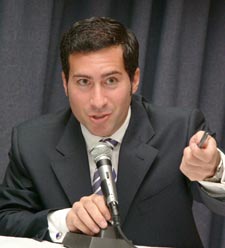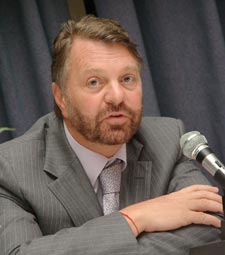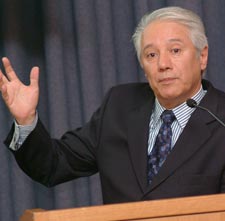
Photo by Chris Taggart
The 2006 presidential election in Mexico had a flavor all its own, with candidate Andres Manuel Lopez Obrador famously admonishing sitting President Vincente Fox (who backed Lopez Obrador’s opponent), with the phrase “Callese chachalaca,” or “shut up, noisy bird.” The insult backfired, with many Mexicans apparently believing Lopez Obrador had crossed a line by demeaning the office of the presidency. The left-leaning Democratic Revolution Party (PRD) went on to lose in early September, Mexico’s top electoral court confirmed Felipe Calderón, the conservative former energy minister, as the country’s next president. He takes office on December 1.
Fordham’s Master’s Program in Elections and Campaign Management and Latin American and Latino Studies programs hosted a distinguished panel of experts to discuss the election on Thursday, Sept. 14. The panel, “Mexico’s 2006 Presidential Race: the Election, the Aftermath and the Political Implications,” was held in cooperation with the New York Chapter of the American Association for Public Opinion Research.
Many of the concerns in Mexico’s presidential election would sound very familiar to Norteamericanos: the influences of money and political consultants; the way the media shape a campaign; and how one governs after a contested victory.
Panelists included Jorge Castañeda, Ph.D., Global Distinguished Professor of Political Science and Latin American Studies at New York University and former foreign minister of Mexico; Ulises Beltrán Ugarte, Ph.D., Centro de Investigactión y Docencia Económicas, and former technical adviser to Presidents Carlos Salinas and Ernesto Zedillo; and was moderated by Costas Panagopoulos, Ph.D., director of the Elections and Campaign Management program at Fordham. Panagopoulos was previously a fellow at the Institution for Social and Policy Studies at Yale University, and served as an American Political Science Association Congressional Fellow in the office of U.S. Senator Hillary Rodham Clinton.

Photo by Chris Taggart
“Do political consultants count or not? I would tent to think not,” said Castañeda. “But at times they can matter. Politicians make decisions based on polls, but everywhere the guys with the money really make decisions based on polls.”
“There are two points of view,” Beltrán Urgarte said. “Political consultants can significantly modify results of elections, or, political consultants have minimal effects on elections. Polls don’t affect the people, but they have an enormous effect on campaigns because politicians read the polls and change their tactics.”
An important factor in the closeness of the presidential race, according to Castañeda, was that Manuel López Obrador, as the former mayor of Mexico City, received “five years of free national media exposure,” raising his profile among voters. He compared the national exposure López Obrador received as mayor of Mexico City to that of Michael Bloomberg, mayor of the City of New York. “It made them both national figures,” he said.
“One of the myths of the election, even among people who don’t accept López Obrador’s position, was that the poor voted for López Obrador and the rich voted for Calderón,” said Castañeda. “But 35 percent of the people voted for Calderón. I wish we had a country in which 35 percent of the people were rich; we would have a great country.”
“The two electorates [for López Obrador and Calderón]are very similar,” Castañeda said. “If they weren’t, López Obrador would have lost by many more points.”
“What comes now?” Castañeda said. “I am more concerned about the future based on a number: the 35 percent protesting [Calderón’s victory]. It is very difficult to get anywhere if you have 35 percent of the

technical adviser to Presidents Carlos
Salinas and Ernesto Zedillo.
Photo by Chris Taggart
vote, which Calderón does, and 35 percent of the people opposing you. It’s very hard to get anything done.”
